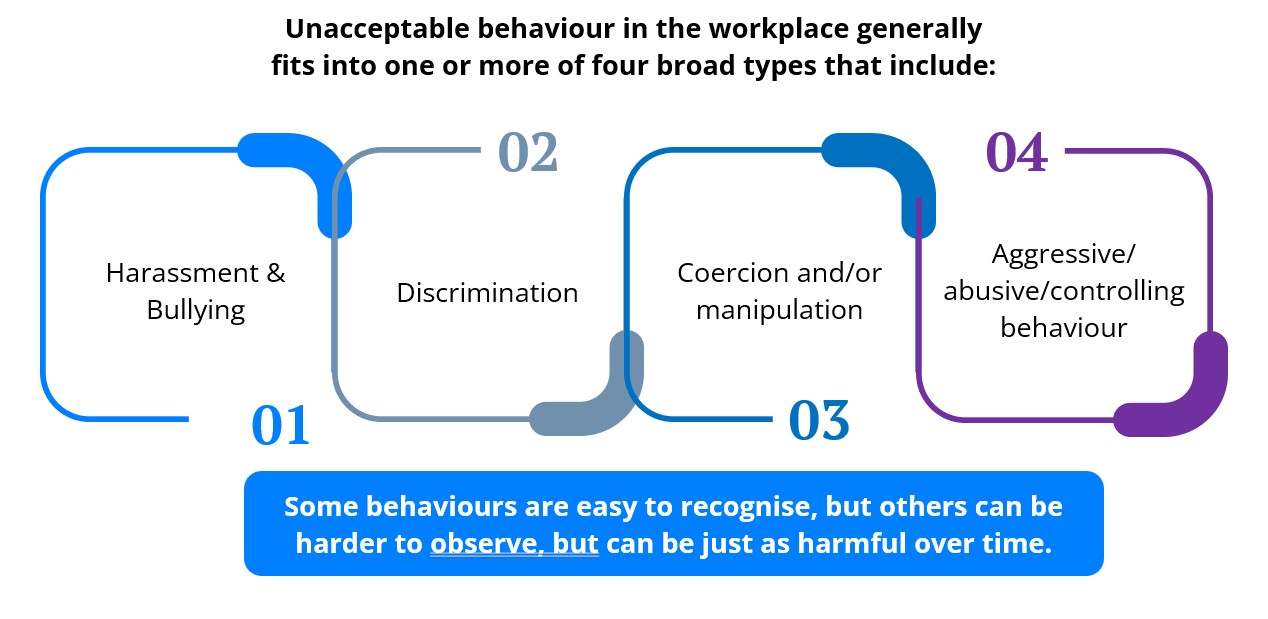Active Bystander Training Online
For Employees & Teams
Convenient online training equipping you to understand and become an “Active Bystander” in your workplace – just $45 incl GST.

Online Course Summary
Price: $45 incl GST
Course Duration: Approx 68 mins.
Number of modules: 8
Our online Active Bystander Training course equips employees and workplace teams with the knowledge and skills to recognise and effectively intervene in situations involving harassment, discrimination, or other unacceptable and illegal behaviours.
Participants will learn about what an active bystander is, what they do and how they do it, and why it’s so important in the modern Australian workplace.
Participants will also learn about de-escalation techniques, effective communication strategies, and how to navigate complex power dynamics, as well as emotional intelligence and assertiveness skills in order to confidently address conflicts whilst prioritising their wellbeing and that of others.
Online Active Bystander Training Overview

Course Overview
This comprehensive 8-module online course equips employees and teams with practical skills to recognise, respond to, and prevent workplace harassment, discrimination, and inappropriate behaviours. Participants develop confidence to intervene safely whilst protecting their own wellbeing and that of colleagues.
Module 1: Introduction to Being an Active Bystander. Understand the critical difference between passive observation and active intervention. Learn the legal requirements under Australian workplace legislation, including the positive duty under the Sex Discrimination Act 1984, and discover why active bystanders are essential for creating respectful, safe workplace cultures.
Module 2: Recognising Harmful Situations and Behaviours. Develop skills to identify unacceptable workplace behaviours, from obvious harassment to subtle passive-aggressive conduct. Learn to read nonverbal cues and body language that signal someone may need assistance, and understand the serious consequences of remaining a passive bystander.
Module 3: Barriers to Bystander Intervention. Explore common obstacles that prevent intervention, including cultural barriers, fear of retaliation, lack of training, and legal concerns. Gain practical strategies to overcome personal hesitations and social pressures that may inhibit your ability to act when situations require intervention.
Module 4: Safe Intervention as an Active Bystander. Master the four key intervention strategies: Direct action, Distraction, Delegation, and Delayed response. Learn to assess situational risks, understand organisational protocols, and prioritise personal safety whilst effectively addressing inappropriate behaviours in the workplace.
Module 5: Developing Skills for Safe and Successful Interventions Build essential capabilities including de-escalation techniques, effective communication strategies, and conflict resolution skills. Develop emotional intelligence, empathy, and assertiveness to confidently navigate challenging situations and manage aggressive behaviours professionally.
Module 6: Supporting a Culture of Active Bystandership Learn how to foster an organisational environment that encourages positive intervention. Understand the importance of building supportive communities, addressing power dynamics, and creating systems where employees feel empowered to speak up and take action.
Module 7: Seeking Support Post-Intervention Discover how to manage the emotional impact of intervention on yourself and others. Learn to provide ongoing support to affected colleagues, access professional resources, and maintain your own wellbeing after taking action in challenging workplace situations.
Module 8: Key Takeaways and Course Summary Consolidate your learning and develop a personal action plan for implementing active bystander strategies in your workplace. Review essential intervention techniques and commitment strategies to maintain skills and confidence over time.
Start your online course here or contact us here.

Learning Outcomes
Upon successful completion of this Active Bystander Training course, participants will be able to:
Knowledge and Understanding
Legal and Regulatory Framework
- Explain the legal requirements for workplace intervention under Australian legislation, including the Sex Discrimination Act 1984 and positive duty obligations
- Identify the consequences of inaction and the legal protections available to active bystanders
- Understand vicarious liability and organisational responsibilities for preventing workplace harassment and discrimination
Workplace Behaviour Recognition
- Define and distinguish between different types of unacceptable workplace behaviours, including harassment, bullying, discrimination, and passive-aggressive conduct
- Recognise the risk factors and environmental conditions that contribute to inappropriate workplace behaviours
- Identify subtle and overt signs that indicate someone may need assistance or intervention
Skills and Application
Risk Assessment and Situational Awareness
- Assess situational risks and determine appropriate intervention strategies based on safety considerations
- Interpret nonverbal cues, body language, and environmental factors to evaluate potentially harmful situations
- Demonstrate situational awareness skills to anticipate and prevent escalation of workplace conflicts
Intervention Techniques
- Apply the four intervention strategies (Direct action, Distraction, Delegation, Delayed response) appropriately to different workplace scenarios
- Implement de-escalation techniques to reduce tension and manage aggressive behaviours safely
- Use assertive communication and conflict resolution skills to address inappropriate conduct effectively
Communication and Emotional Intelligence
- Demonstrate active listening skills and empathetic communication when supporting colleagues
- Apply emotional intelligence to manage personal emotions and respond appropriately to others’ emotional states
- Communicate assertively without becoming aggressive, maintaining professional boundaries whilst addressing unacceptable behaviours
We also have face-to-face and virtual classroom active bystander training available
Professional Practice
Organisational Navigation
- Navigate organisational protocols, reporting procedures, and hierarchical structures when addressing workplace incidents
- Understand confidentiality requirements and appropriate channels for reporting concerns
- Collaborate effectively with management, HR, and support services to ensure proper incident handling
Cultural Development
- Contribute to building a workplace culture that encourages active bystandership and mutual support
- Address power dynamics and barriers that may prevent effective intervention
- Model respectful behaviour and encourage open communication about workplace concerns
Personal and Professional Support
- Implement self-care strategies to maintain personal wellbeing when intervening in challenging situations
- Provide appropriate support to colleagues who have experienced workplace harassment or discrimination
- Access and utilise available resources, including counselling services, employee assistance programmes, and professional support networks
Critical Thinking and Problem Solving
Barrier Analysis and Resolution
- Identify personal, cultural, and organisational barriers to effective bystander intervention
- Develop strategies to overcome hesitation, fear of retaliation, and other impediments to taking action
- Evaluate the effectiveness of intervention attempts and adjust approaches based on outcomes
Ethical Decision Making
- Make informed decisions about when and how to intervene in workplace situations involving inappropriate behaviour
- Balance competing considerations including personal safety, colleague wellbeing, and organisational requirements
- Demonstrate moral courage and ethical responsibility in challenging workplace situations
Ongoing Development
Continuous Improvement
- Reflect critically on intervention experiences to identify learning opportunities and areas for skill development
- Seek ongoing training and professional development to enhance active bystander capabilities
- Contribute to organisational learning by sharing experiences and providing feedback on policies and procedures
Community Building
- Encourage and support colleagues in developing active bystander skills and confidence
- Participate in creating and maintaining workplace environments that prioritise safety, respect, and inclusion
- Advocate for systemic changes that prevent inappropriate workplace behaviours and support positive organisational culture
Start your online course here or contact us here.
FAQ’s
Question: How long does the course take?
Answer: The course takes approximately 60 minutes to complete.
Question: Is there a test at the end?
Answer: Yes, there is a short quiz at the end of the course to test your knowledge.
Question: Do I get a certificate?
Answer: Yes, you will receive a certificate of completion upon successful completion of the course.
Question: Is the course mobile friendly?
Answer: Yes, the course is fully mobile friendly and can be completed on any device.
Question: Can I purchase multiple licenses for my team?
Answer: Yes, we offer discounts for bulk purchases. Please contact us for a quote.
